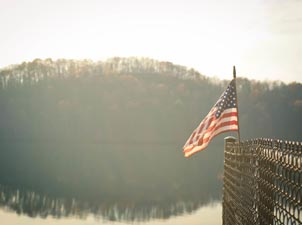
Freedom for Some, But Not for All
Mary Cunningham
July 4, 2018
July 4, 1776: the day the Declaration of Independence was adopted. Since then, each July 4th we celebrate our nation’s freedom from an overbearing colonial rule and our fervent patriotism. We dress in red, white, and blue, enjoy cookouts with neighbors in our backyards, and watch from picnic blankets as fireworks erupt across the sky. Yes, the day has become commercialized, but the words of the Declaration of Independence remain as pertinent in our current political climate as they were when they were first written.
The document written by our founding fathers clearly declares our commitment to “unalienable Rights” defined as “Life, Liberty and the pursuit of Happiness.” It even goes so far as to say that when a government fails to protect these rights, it is the duty of the people to alter or abolish it, and that a leader whose actions resemble a tyrant cannot be trusted to rule and uphold the freedom of the people. Thus, we see the intricate and fragile relationship that exists between the government and the governed.
Take a snapshot of the United States at this exact moment, and you will realize that we have do not have good governance, and that many in our country still lack the rights which the Declaration of Independence deems “inalienable.” In his “I Have a Dream” speech, Rev. Dr. Martin Luther King Jr. talked about what was meant by this term: “This note was a promise that all men, yes, black men as well as white men, would be guaranteed the unalienable rights of life, liberty, and the pursuit of happiness. It is obvious today that America has defaulted on this promissory note insofar as her citizens of color are concerned.”
The default on the promise of “inalienable rights” was evident during Rev. Dr. Martin Luther King Jr.’s time and it is still evident today for people of color and all on the economic margins seeking to live freely in the United States. We see this in the recent decision by the Supreme Court to uphold the Trump administration’s travel ban, Congress’s failure to pass a Dream Act to protect DACA recipients, and state and federal attempts to impose work requirements on human needs programs that help our nation’s most vulnerable families and individuals. How do these political decisions enhance the life, liberty, or happiness of the people they impact? They don’t.
On a more personal level, we have begun to fail one another, as violent discrimination and exclusion continue to reign. Our nation has endured countless acts of police brutality and racial profiling. I am astonished on a daily basis by the attacks on communities of color, like the recent shooting of high school student Antwon Rose. If we set a standard that “all men are created equal,” shouldn’t we hold all people to that standard, regardless of race, gender, or religious beliefs?
A few days ago, one of my coworkers sent around a video from the show, Dear White People, to our staff. In the video, the character Reggie reads a poem he wrote for an open mic night—his rendition of the Declaration of Independence:
We hold these truths to be self-evident
that all men are created equal
that they are endowed by their creator
with certain inalienable rights
Among these life, liberty and
the pursuit of happiness
unless you’re loud and black
and possess an opinion
then all you get is a bullet
A bullet that held me at bay
A bullet that can puncture my skin
take all my dreams away
A bullet that can silence
the words I speak to my mother
just because I’m
other
A bullet – held me captive
gun in my face
your hate misplaced
White skin, light skin
but for me not the
right skin
Judging me with no crime committed
reckless trigger finger itching to
prove your worth by disproving mine
My life in your hands
My life on the line
Fred Hampton
Tamir Rice. Rekia Boyd
Reggie Green
Spared by a piece of paper
a student ID
that you had to see before
you could identify
me
and set me supposedly
free
Life
liberty
and the pursuit of happiness
for some of us maybe
There’s nothing
self-evident
about it
The Declaration of Independence pronounced the individual rights that cannot be taken away. In 1776, that only included white, male landowners. After much hard work and sacrifice, we know that all people deserve these same unalienable rights. But, we see that as a nation today, we fall despairingly short of this. The words of the Declaration of Independence should not be an ideal or something that we aspire to. They must be the law of the land, the fabric which knits our country together. For if we cannot claim our freedom, what do we have left?







